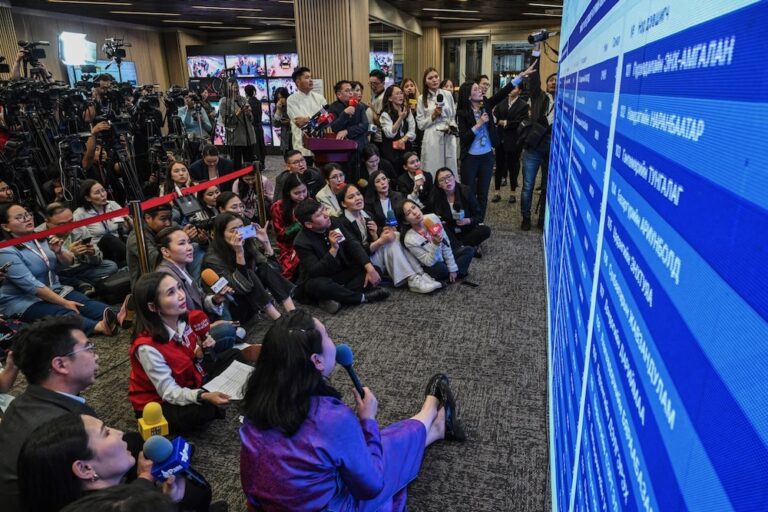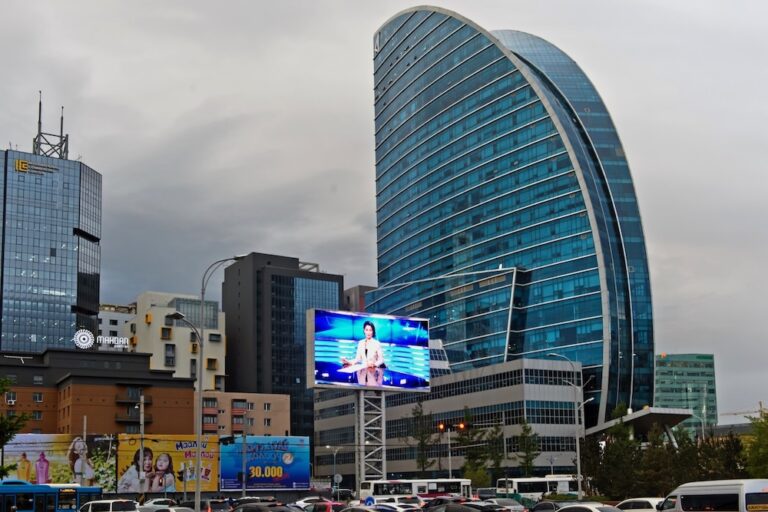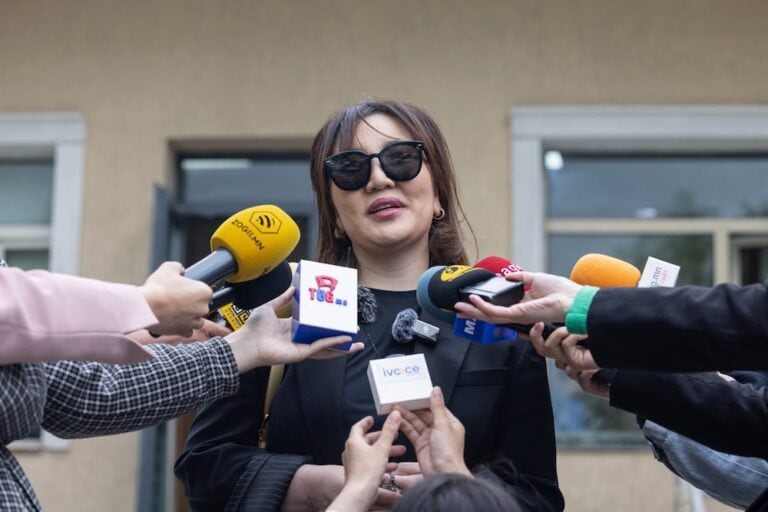(Globe International/IFEX) – Globe International is deeply concerned about civil and criminal defamation charges brought against researchers and journalists by Mongolian politicians, including the current President N. Enkhbayar, and urges these politicians to respect press freedom and freedom of expression as guaranteed under the Mongolian Constitution. Globe International considers that by prosecuting journalists, these politicians […]
(Globe International/IFEX) – Globe International is deeply concerned about civil and criminal defamation charges brought against researchers and journalists by Mongolian politicians, including the current President N. Enkhbayar, and urges these politicians to respect press freedom and freedom of expression as guaranteed under the Mongolian Constitution. Globe International considers that by prosecuting journalists, these politicians are attempting to intimidate the media into not reporting criticism.
A Globe International survey on libel and defamation suits in the six district courts of Mongolia’s capital, Ulaanbaatar, reveals that a total of 121 civil defamation charges were brought against journalists and media organisations between 2001 and 2004. In 33 of these cases, the journalists were charged with libel as a result of complaints made by politicians. Another 13 suits were initiated by public officials and organisations. Mongolia’s strict defamation legislation and secrecy laws make it dangerous for journalists even to make simple references to anything concerning topics such as state corruption. The increasing use of litigation to control press criticism is negatively affecting freedoms of the press and expression, says Globe International.
In one such case, weekly newspaper “Uls Turiin Sonin” political news editor Mrs. Uyanga was summoned before the Chingeltei District court to answer a complaint filed by the Trade and Development Bank (TDB), which demanded that the Court stipulate that President Enkhbayar did not own shares in TDB, that the reporter apologize and publish a correction in the newspaper and that the newspaper pay 100 million tugriks (approx. US$89,260) in damages to the plaintiff.
In its second issue of 2006, the weekly “Uls Turiin Sonin” published an article headlined “President, the Millionaire,” in which the writer argued that President Enkhbayar possibly owns a substantial share of the TDB.
The article said that privatization of the TDB occurred under extraordinary circumstances when President Enkhbayar was prime minister, and that the new TDB owners were allowed to pay for the purchase later than was stipulated in the sale contract.
The weekly further claimed that the president’s substantial interest might be behind the soon-to-be-built Shangri La office tower, construction of which is licensed to the MCS company. The Shangri La is in the centre of Ulaanbaatar, and the building site was cleared by destroying a large section of a beautiful public park, prompting such public outrage that a group of demonstrators damaged property at the site a few months ago.
On 23 February 2006, the Chingeltei District Court of Ulaanbaatar accepted the demands of the TDB, with some modifications. Mrs. Uyanga was ordered to pay 10 million tugriks (approximately US$9,700) to the TDB and to publish a correction in the newspaper.
Also, the Court, accepting documents provided by the TDB, found that President Enkhbayar was not among the named shareholders of the bank.
Mr. G. Dashrentsen, accused of criminal defamation in a suit that has been pending in the Mongolian Police Enquiry Department since 28 January 2006, is now accused of publishing defamatory articles about President Nambariin Enkhbayar.
“After checking through all my published articles in newspapers since May 2005, the president lodged a complaint with the Bayanzurkh district court of Ulaanbaatar through his attorney, Mr. D. Batsukh, on 21 March this year,” he told Globe International.
Dashrentsen said, “The claim to the court stated that as a journalist, I violated article 16 of the Mongolian Law on the President, which states ‘the President’s . . . name shall be inviolable.'”
Dashrentsen added, “Anyone who criticized the President before had to deal at the court with someone to whom President Enkhbayar has showed special consideration. This is first time the president himself has appealed to the civil court with his own complaint.”
The Mongolian media, including Dashrentsen’s colleagues at “Udriin Sonin” (“Daily News”), have been covering the issue intensively and have called on other journalists to defend him.
In another case, the state-owned Mongol Bank’s president U. Chuluunbat has filed a civil defamation suit against Mr. D. Ganhyag, a political researcher, for an article published in the newspaper “Mongol Times”, March 2005, entitled “Big debt and U. U. Tsolmon (first lady of Mongolia) and US$8 million.” The case is still pending. Under current Mongolian legislation, anyone accused of libel and defamation faces a possible two to five year jail term and fines and damages set by the court. Globe International urges the Mongolian authorities to repeal the criminal defamation legislation and regulate such actions by civil law, and calls on politicians and public officials to be more tolerant and open to criticism.


